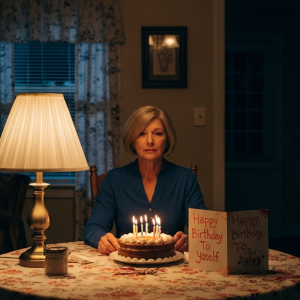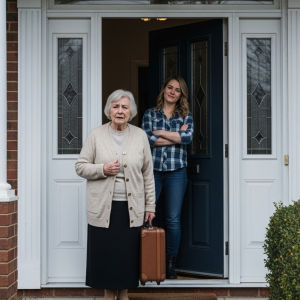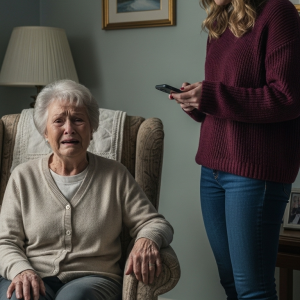“Get out. We want our space.” The words, spoken by my daughter-in-law, Vanessa, sliced through the dusty air of the house I still owned. My son, my only child, Michael, just stood there, his eyes fixed on the floor, saying nothing. That single, brutal moment changed everything. This is my story of deception, heartbreak, and finding the courage to reclaim my life at seventy-eight.
It began with a discovery on a quiet Tuesday afternoon. I was cleaning my late husband Harold’s desk when I found them: divorce papers, tucked inside a legal pad. Michael had left them behind after our lunch. He hadn’t mentioned his failing marriage, yet here was the evidence, a silent testament to his crumbling world. I was still reeling from that when, three months later, he announced his engagement to Vanessa Taylor, the daughter of my oldest friend, Catherine.
I remembered Vanessa as a child: beautiful, but with a grasping entitlement that Catherine always excused. Now in her late forties, Vanessa had two failed marriages behind her and a predatory gleam in her eye. At their engagement dinner, hosted in my home, she circled my antiques like a vulture. “This chandelier must be worth a fortune,” she’d commented, her gaze fixed on the crystal fixture Harold had installed himself.
“It’s not about the value,” I’d replied gently. “It’s about the memories.”
After dinner, Michael pulled me aside, the picture of a man drowning. He’d lost nearly everything in a tech crash. The life he’d built was gone. Before I could respond, Vanessa was there, wrapping herself around his arm, her smile a mask of polite dismissal. “Your mother doesn’t need to worry about our problems, darling.”
That night, consumed by a mother’s instinct to fix things, I made a decision that would unravel my life. The Colonial house on Maple Street, an investment property Harold and I had lovingly restored, was sitting empty. The next morning, I called Michael.
“I have a solution,” I said. “You and Vanessa can live there as long as you need. It’s yours to live in, but I’ll keep the deed in my name. It’s part of my retirement plan.”
He was overcome with gratitude. “Mom, we couldn’t…”
“I insist,” I said, silencing his protests.
When I handed him the keys, Vanessa walked through the historic home, her perfectly manicured finger tracing the original woodwork. “It’s old-fashioned,” she said with a thin, dismissive smile. “But we can work with it.” Michael embraced me tightly. “Thank you, Mom. We won’t forget this.” As I drove home, a strange heaviness settled in my chest. I had no idea I had just handed over the keys to what would become my prison of guilt and betrayal.
It started with unanswered phone calls. Then came the excuses. My weekly Sunday dinners, a family tradition for decades, were now inconvenient. Work commitments, previous engagements, Vanessa feeling under the weather. I kept a small journal, a habit from my years as a school principal, not to keep score, but to convince myself I wasn’t imagining the growing chasm between us.
One afternoon, I brought over Michael’s favorite lasagna. Vanessa answered the door, her smile faltering. “Eleanor. This is unexpected.” The house was already changing. The warm cream walls were stark white, the antique furniture replaced with sleek, modern pieces that felt cold and out of place. While Michael was in his office, I overheard Vanessa’s sharp whisper from the hallway.
“I can’t believe she just showed up again. It’s like we have no privacy anymore. Your mother needs to understand boundaries, Michael.”
I quietly gathered my purse and left, the untouched lasagna a testament to my failed offering. The words felt like a surrender, but a surrender to something I couldn’t yet name.
The distance grew. By Thanksgiving, I felt like a stranger in my own family. They arrived an hour late, Vanessa sweeping in and immediately critiquing my home. “This place is exactly the same,” she said, running a finger along the mahogany sideboard. “Don’t you ever think about updating, Eleanor? All these antiques make it feel like a museum.”
During dinner, she steered the conversation to my future. “Frankly, Eleanor, a house this size for a person of your age… it seems wasteful. There are some lovely retirement communities in Lexington. Very upscale.”
“I’m not ready for that yet,” I said, my voice tight.
“Well, no one is ever ready to admit they’re getting older,” she laughed. “What will you do with all these heirlooms? We don’t need to clutter our space with old things.” I looked at Michael, but my son, who once cherished these family treasures, just stared at his plate in silence.
After they left, I noticed my grandmother’s diamond brooch was missing from the display cabinet. I searched everywhere, my heart pounding with a sickening dread. I refused to consider the alternative, but that night, I wrote in my journal: Missing diamond brooch. Also missing the son who once would have helped me search for it.
My 79th birthday dawned bright and clear, but my phone remained silent. By evening, disappointment had curdled into determination. I baked my own lemon cake, put on my favorite dress, and drove to their house—my house—with the cake on the passenger seat.
As I turned onto Maple Street, I saw cars lining the road. Music and laughter spilled from the open windows. Confused, I rang the doorbell. The music stopped. Michael opened the door, his festive expression collapsing into one of horror.
“Mom? What are you doing here?”
Behind him, I could see a dinner party in full swing. My friend Catherine was there, her eyes filled with pity. “It’s my birthday,” I said, the words sounding small and pathetic.
Vanessa appeared beside him, a champagne glass in her hand. “Eleanor, what a surprise! Oh dear, is it your birthday? We had no idea. We’re celebrating Michael’s promotion.”
Michael, at least, had the decency to look ashamed. “Mom, I’m so sorry. I completely forgot.”
I handed him the cake, my smile feeling like it might crack my face. “It’s nothing. Enjoy your celebration.”
“Happy birthday, Eleanor,” Vanessa said, already closing the door.
I drove home in a blur of tears, the image of my son’s party burned into my mind. That night, I didn’t just cry for the forgotten birthday. I cried for the little boy who once made me crayon hearts, and for the middle-aged stranger who had taken his place.
Two months later, I had to drop off some insurance documents. I arrived at the Colonial to find it in chaos. A dumpster sat on my lawn, and the air was thick with plaster dust. Inside, workers were tearing out the original hardwood floors and crown molding. But it was the bay window that made my heart stop. They were removing the 19th-century stained-glass panels, the very feature that had made Harold and me fall in love with the house.
“What are they doing?” I whispered to Michael.
Vanessa appeared, wearing a hard hat like a fashion accessory. “Eleanor! What do you think of our modernization project? Those dated windows are the first to go.”
“Those windows are irreplaceable,” I said, my voice shaking. “This house is on the historic register because of them.”
A contractor approached. “Is there a problem? I was told you approved all these changes, Mrs. Wilson.”
“I did no such thing,” I said, turning to Michael, who was suddenly fascinated by his shoes.
Vanessa’s poise finally vanished. “That’s it! We always knew there were strings attached! Get out! We want our space!”
The contractor backed away. I looked at Michael, waiting for him to defend me, to defend his father’s memory. He finally looked up, not at his wife, but at me. “I think it’s better if you go, Mom,” he said quietly. “We’ll talk later.”
I walked out of that house, my house, trembling not with sadness, but with a pure, cleansing rage. The time for turning the other cheek was over.
“Eleanor, you need to check your financial statements,” my friend Patricia said, her lawyer’s mind already at work. “The cost for renovations like that would be astronomical. Where is the money coming from?”
The next morning, my accountant, Mr. Reynolds, confirmed my worst fears. “I’ve been trying to reach you for months, Mrs. Wilson. We’ve received several alerts about unusual activity.”
He laid out the evidence of a slow, systematic theft. Credit cards opened in my name. Small withdrawals from my accounts over eighteen months, totaling more than sixty-five thousand dollars. Most of the transactions occurred within twenty-four hours of a visit from Michael and Vanessa. He also showed me partially completed property transfer documents, with my signature expertly forged at the bottom.
“I never signed these,” I whispered.
Mr. Reynolds’s face was grim. “The investigator I hired also noticed your mail appears to have been tampered with. We need to secure your assets immediately.”
The betrayal was so profound, so calculated, it was almost hard to comprehend. But as I sat there, a strange calm washed over me. The confusion was gone, replaced by a cold, hard clarity.
My first move was to sell the Colonial on Maple Street. I wanted it gone, a toxic asset excised from my life. The notification letter went out the next day, formal and legally binding. Then, Vanessa began her campaign.
She posted on family support forums, painting a picture of a confused, elderly mother-in-law being manipulated by unscrupulous advisors. She was the devoted daughter-in-law, trying to protect her vulnerable mother. The comments were predictably sympathetic. She was gaslighting me on a public stage.
Then my oldest friend, Catherine, Vanessa’s mother, showed up at my door. “Vanessa says you’ve been confused lately, forgetting conversations,” she said, her loyalty clearly torn.
“Perhaps,” I replied, my voice like ice, “you should ask your daughter about the credit cards opened in my name, or the $65,000 missing from my accounts.” I handed her the folder of evidence Mr. Reynolds had prepared. She left looking shaken, the decades of our friendship hanging in the balance.
Just when I thought it couldn’t get worse, a discovery was made that exposed the true depth of Vanessa’s depravity. Rose Martinez, Harold’s former assistant, called me. She had seen Vanessa’s posts online and recognized her name. Years ago, Harold had kept a private file on Vanessa, documenting a pattern of financial misconduct involving elderly clients at three different banks where she had worked. He had suspected she was a predator long before she ever entered our family.
“He kept the file in case she ever became involved in the Wilson family finances,” Rose explained. Harold had seen what I hadn’t. He had tried to protect me, even from beyond the grave.
I arranged the evidence on my coffee table in four neat folders: Financial Fraud, Property Documentation, Harold’s File, Sale Contract. The doorbell rang. It was Catherine, with Michael and Vanessa in tow.
“I thought it might be better to address everything together,” Catherine said, looking ill.
The final confrontation had begun. I laid out the evidence, piece by painful piece. The bank statements. The forged property transfer. And finally, Harold’s file, detailing Vanessa’s history of preying on the elderly.
Michael stared at the documents, the color draining from his face. “I didn’t know,” he whispered, looking at me with the eyes of the little boy I once knew. “Mom, I swear, I didn’t know.”
Vanessa lunged for the file, but Catherine caught her arm. “Stop it, Vanessa. Just stop.”
“You’re believing this senile old woman over your own daughter?” Vanessa hissed.
Catherine’s voice was filled with a lifetime of regret. “What I believe is the evidence I’ve seen with my own eyes. The pattern I’ve ignored for too long. My husband and I paid settlements, Eleanor, to keep her ‘indiscretions’ quiet for years.”
The room fell silent. Vanessa’s carefully constructed world had crumbled.
“The Colonial has been sold,” I announced, placing the final folder on the table. “The new owners take possession in sixty days.”
“You can’t do that!” Vanessa shrieked. “We’ll have you declared incompetent!”
“With what evidence?” I asked quietly. “The testimony of a woman with a documented history of financial elder abuse? Or my confused son, who can’t explain where the renovation money came from?”
My son finally looked at me, his face a mask of shame and horror. He had chosen comfort over integrity, and in doing so, had become an accomplice to the woman who was destroying his mother.
The legal agreement was simple. In exchange for my silence on the criminal charges, Vanessa would relinquish all claims to my assets and agree to have no further contact. I just wanted the chapter closed. She moved to Arizona. Michael moved into a small apartment downtown, and filed for divorce.
The silence from my son was the hardest part. But as weeks turned into months, I began to build a new life. I joined a financial literacy support group for seniors who had experienced exploitation. I started watercolor painting. I reconnected with friends. I was no longer just a widow or a mother; I was Eleanor.
One evening, my doorbell rang. Michael stood on the porch, looking gaunt and broken. “Mom,” he said, his voice cracking. “I don’t even know where to begin.”
“To say you’re sorry seems inadequate,” I said, not unkindly.
“It is,” he agreed. “But it’s a start.”
He told me about the therapy he’d started, about confronting the weakness that had allowed Vanessa to control him. He had been so afraid of failure, so afraid of disappointing me, that he had betrayed everything I’d ever taught him.
“I forgive you, Michael,” I said quietly. “But forgiveness doesn’t erase consequences. We need time.” It wasn’t everything he wanted, but it was the truth.
Three years later, my small support group had grown into a regional organization. We held our first annual fundraiser in my backyard. It was a beautiful summer evening, filled with people whose lives had been touched by our work. As I was speaking with a reporter, I saw a man slip in through the side gate. It was Michael.
He was thinner, his hair completely gray, but his eyes were clear. He was holding Harold’s leather-bound journal—the one that had gone missing after his death.
“I found this among Vanessa’s things,” he said, his voice tight with old anger. “She took it. She was afraid of what it might contain.” Tucked inside were two letters, one for him and one for me, that Harold had written before he died. Letters Vanessa had stolen.
“He knew, Mom,” Michael said, his voice breaking. “He warned me to value integrity over comfort. A lesson I had to learn the hardest way possible.”
We stood together as the fundraiser continued around us. It was a small step, but it felt like the closing of a circle.
Later, I read Harold’s letter. My dearest Eleanor, it began. My greatest wish is that you and Michael will honor what truly matters. Not the houses or investments, but the integrity with which you live. Remember, it is never too late to begin again, to stand firmly in your truth.
Tears blurred the words. He had been right. It wasn’t too late. Not at 79, when I finally stood up for myself, and not at 82, as I helped others do the same. Michael appeared at the patio door. “Need any help?”
“That would be nice,” I said, rising to stand beside my son.
As we worked together in companionable silence, I thought about the long journey that had brought us here. The betrayal and pain, yes, but also the clarity and purpose that had emerged from it. Life is too long to carry resentment, and too short to waste on people who don’t recognize your worth. It had taken me a lifetime to learn that truth. But as Harold would say, better late than never.




